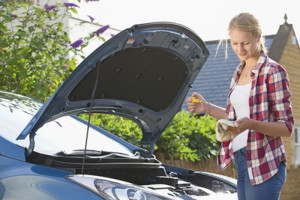 Getting your car serviced by a professional mechanic is something that you should do once in every six months or so, depending on how many miles you draw from the vehicle. There are some things that are best left to the professionals simply because you may not have the tools, the expertise, or the time to do them. Some other things, however, are just not worth taking to the mechanic to get fixed, and you can do them by yourself right at home. An average car is one of the most complicated machines that you use every day, as they have more than ten thousand individual parts that can be removed and replaced. Apart from the engine, the electrical wiring and the doors, there are a good number of things that any person can service.
Getting your car serviced by a professional mechanic is something that you should do once in every six months or so, depending on how many miles you draw from the vehicle. There are some things that are best left to the professionals simply because you may not have the tools, the expertise, or the time to do them. Some other things, however, are just not worth taking to the mechanic to get fixed, and you can do them by yourself right at home. An average car is one of the most complicated machines that you use every day, as they have more than ten thousand individual parts that can be removed and replaced. Apart from the engine, the electrical wiring and the doors, there are a good number of things that any person can service.
Here are a few things that you can do by yourself. The only technical knowledge you need is to know how to hold a spanner.
Tire pressure
Maintenance of good tire pressure directly relates to how much mileage you can get out of your car. Look for wear patterns; if the center band of the tire is worn more than the edges, you have been holding a higher than needed pressure for too long. If your tires edges are getting worn, your tire pressure has been too low for an extended period of time. Check your tire’s manual for the right pressure and check pressure every week.
Tire rotation
If you live in a city or a town with reasonably good roads, chances are, your tire wear is not too drastic, but to keep the tires running longer, you will have to rotate them every 5,000 miles or so. Car tires wear out in a pattern and the pattern is different for forward and rear wheels. Swapping the tires, front to back will keep the tires that are worn on one side face the other, less worn out direction. Tires will naturally last longer when rotated.
Check oil and belts
Engine oil is what keeps the engine running smoothly and lubricates the internals, keeping the engine’s performance at its peak. Too little engine oil can make the engine noisy, increase pollution and lower mileage, among other things. Checking the oil levels are important as if the oil is left in the engine block for too long, it can become a heavy sludge that is difficult to clean and can cause engine failure. There is a dipstick that will show you how much oil is in the engine, so park your car on level ground and let the engine cool down, pull out the dipstick, wipe it with a tissue or a scrap cloth, then dip it back in all the way, and pull it out. There will be two dot sized holes, the level should be between them; if it is touching the lower dot or below it, you need to top up the engine oil immediately.
Modern cars have a good number of belts that drive the engine, compressor, and a host of other parts. They are almost entirely dependent on the belts for running. These belts are made to last a long time, but they are not fail proof, so change them every 50,000 miles. Every 20,000 miles get them checked for timing.
Lights
You should carry a spare set of head lamps and tail lights in your car at all times. You do not want to be out on the highway or a back road, driving blind on one side. You can also get fined if you do not have properly functioning lamps.
These are just few of the things that most people get done in the shop rather than by themselves and spend precious dollars on something that you can do at home.